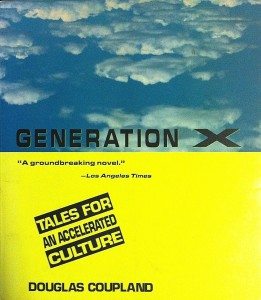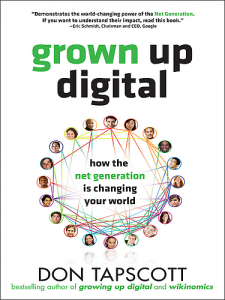There is a tendency in the west to isolate/celebrate/commemorate a symbolic sloughing off of a decade, an obsession, perhaps, to demonstrate some tangible progress. I am left feeling conflicted about the current trend in educational discourse that postulates the latest edu-speak and profits from the sales of the latest and newest gadgets encouraging us to ‘get with the programme’ for fear of being left behind.
Douglas Coupland co-opted me as a member of Gen X (just barely, mind you). I grew up with Pac Man, Atari and Nintendo, Cyndi Lauper, and MTV. I was interested in creative pursuits, enjoyed socializing and time on my own, wanted my independence and believed in the power of Elvis Costello, the Pixies, and Leonard Cohen.
When I consider the students that sit in my classroom today, I am neither impaired by a huge chasm that separates them from me, nor am I a ‘digital immigrant’ struggling to make my way through a lesson. Rather, I am mindful that we are all faced with the challenges and consequences of what has been dubbed the digital age. I see in my students’ faces the same desires and worries, fears and dreams that I, and my contemporaries, had when we were in high school. Today’s students want to socialize, to fit in. They want to demonstrate their independence, their authenticity and value as unique individuals. They want to know they matter.
The difference today is that more than ever before, teenagers have to contend with ubiquitous chatter–information and misinformation–coming at them from all media. Growing up in a time where computers are commonplace and the Internet has always been, does not make students digital natives. They are not inherently able to decipher the many messages emitted from the techno tower of Babel. But it is not only those born between 1977 and 1997 (Tapscott) that must contend with (and adapt to) these rapid-fire changes in technology and communication.
We are all in this boat, together.


Getting with the programme, yes, but who manages the programme? Seems to me that in education there must always be a delicate balance between what students want and what they need, what gratifies them and what challenges them. This balance is harder to maintain now that technology giants provide the tools that seem at times to drive education rather than serve it. They drive education at the accelerated speed that students want. Nothing wrong with that as long as teachers are doing the navigating. Otherwise there will be collisions and casualties, one of which might already be the sustained and focused reading that has caused some teachers of English to consider removing novels from the “programme”. Is it time to slow down and reflect on the landscape more?
Hi Colin. Thank you for your comments. You present a number of valid concerns and ask the essential questions. And I am afraid, the collisions and casualties are growing in numbers. The weekly block of time designated for quiet reading at our school, is now a thing of the past. Not sure why.
Your image of the landscape works for me. So much is missed if you only glance in its direction. To really regard a landscape, and make it your own, a familiar place, you must spend time there. The paintings created by the Group of Seven are exquisite, haunting, because of the time spent just looking. Reading. Communing with what was infront of them. It took time for them to enter the landscape and, in turn, for the landscape to entire them.
I wonder how much our students miss when reading with a cacophony of notifications, pings, and ringtones, and with pop ups and widgets about them, vying for their immediate and momentary attention. What do they miss when they no longer look out the window at the landscape in front of them?
The generalizations of writers who focus on the relationship of the recent generation to technology has always left me a bit frustrated. My daily experience certainly suggests that the “digital native”, as defined by these writers, does not really exist. Like students before them, they are seemingly born good at some stuff and less so at others.
I have just started reading Marc Prensky’s new book called Brain Gain, my initial impression is it is a salvo against writers like Nicholas Carr, who have expressed misgivings about some of the effects of mass technology. Since Prensky is so much at the centre of this conversation I hope to blog on it shortly.We shall see if it adds to the debate!
Thanks for your comments, Tim.
I found Nicholas Carr’s The Shallows very compelling. The rapid-fire transmission of ideas and content over the Internet is changing the way students think and process information. As teachers, we watch our students struggle when faced with tasks that require long periods of uninterrupted, focused reading. What isn’t bite-sized, immediate, or multi-task-able tends to be dismissed as out-dated and is abandoned. Carr contends that, “The future of knowledge and culture no longer lies in books or newspapers or tv shows or radio programmes or records or CDs: it lies in digital files shot through our universal medium at the speed of light.” But that is only part of his argument. What is lost along the way, he claims, is “the ability to know in depth, a subject for ourselves, to construct within our own minds the rich and idiosyncratic set of connections that give rise to a singular intelligence.” It seems now, more than ever, we must find a balance between traditional and digital skills and ways of teaching and learning.
I am curious to learn what you will make of the Brain Gain and if you will recommend it. Thanks again for your thoughts. I look forward to reading your posts.
The most impressive part of Carr’s book is his take on the origins of printing and its psychological impact on readers and a literate culture generally. Print liberated knowledge and wisdom. Carr doesn’t take sides; that’s his most persuasive quality. He just wants people to remain free to think for themselves, as we all do, especially as teachers. I don’t think Apple thinks the same way. Or Microsoft. Or Intel. They just want to make money by selling products that entice people to believe that they are empowered, whatever that means. And they have many disciples who do the dog and pony act on tour (i.e. educational conferences). I love the tools..I’m using them now…but they are just tools, not gurus. Someone should tell them that.
We have to prepare our students for their future. But we have to understand the present first, or they have no chance.
The Michael Mason controversy at Queens right now is a good one to put under the microscope…what students want when they are instructed only to know about the future as opposed to what they need to know about the past in order to understand the present. If they know nothing of the past, either through history or literature, then of course they will only see Mason as a sexist and racist, not as a historian who can enlighten them about human nature and our attempts to evolve. Entitlement is a two-edged sword: it can slice the jugular of education altogether. One day we will be reduced to asking high school students what to teach them. And how. Sometimes I wonder if we are just giving them placebos and passing the buck to the universities, giving everyone a diploma regardless. If it makes our lives easier I can of course sympathize; but it’s not preparing them for anything. Reminded of the little child on FB who cries into the camera because she’s tired of Obama and Romney. Sorry you’re bored, little one, but life and learning are not entertaining. She might be another one who ends up at Queen’s with nerve endings where she should have skin.
A brilliant and popular professor was disciplined and nearly fired for speaking the unpleasant truth in a university setting. Someone in his classroom was not prepared to listen. That’s what’s disturbing.
From the New York Times: what’s happening in the US these days. Again, a question about balance.
http://www.nytimes.com/2012/11/01/education/technology-is-changing-how-students-learn-teachers-say.html?ref=mattrichtel&_r=0